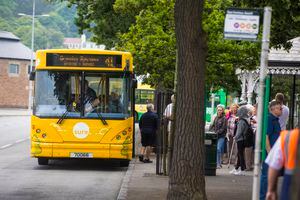The system ain’t perfect, but we’d be far poorer without our bus service
When Deputy Peter Roffey listed the bus service as a ‘positive’, there was derision from some quarters. Don’t knock it, he says, buses keep the wheels of the economy turning...

TODAY I want to speak out in praise of buses.
I think they are great and really important to our Guernsey community. They promote inclusiveness and are an important economic enabler. In short, increasing bus use is a jolly good thing. But why do I feel the burning need to say so just now?
In a recent column I included the ever growing popularity of Guernsey’s bus service on a list of reasons to be cheerful. That brought forth a certain amount of derision in some quarters. Cynics felt this was a pretty feeble excuse for a success story and hinted that I must be scraping at the bottom of the barrel when it came to positive news. I profoundly disagree.
One naysayer pointed out that all the States’ subsidy had done was encourage him to use buses rather than taxis and saved him lots of cash in the process. While he was a happy punter he felt this was a pretty poor use of public funds. He misses the point on two fronts.
Firstly, he is very lucky to be in the position where he has enough money to be able to choose between those transport options. Very many islanders do not.
Secondly, it is not just the individual passengers who benefit when people start using buses, instead of private vehicles, for some of their journeys. It is also the general population.
Politicians speaking up for the buses seem to raise some people’s hackles. I don’t know why. The same is true to some extent of deputies brave enough to support cycling. Despite that ingrained negativity among a section of our community I definitely champion both. So let me explain – to those who will listen – why I think buses are so important.
Firstly they are a social service. There are a huge number of people in Guernsey who have no ability to travel by private transport. Some can’t afford it. Some have medical conditions which prevent them driving. Some are elderly and have lost their confidence as they become more frail. At the other end of the scale some are simply too young to drive.
I know this last group could get on their bikes, and I would encourage them to do so where practical, but that isn’t always the case.
When it’s not, then the alternative is usually mum or dad’s taxi service which has several down sides, of which more in a moment.
For the other groups of non-driving locals the alternative to buses (for all but the lucky few who could afford frequent taxis) would be to simply not travel about the island very much at all. How sad would that be?
Of course it is not just locals who depend on our bus service, visitors do too.
At the moment our tourism sector is struggling somewhat. We are told there are two main reasons for this. The first is the cost of getting here but the second is the product itself. To a proud Guernseyman this is hard to stomach. We have some of the best beaches in the world so what more do they want? It seems the answer is greater investment in our tourism offer. Despite this criticism one thing which brings almost universal praise from our visitors is our local bus service. As such it is helping to create a positive experience of Guernsey and thereby supporting a crucial part of the local economy.
Then of course there is the biggest reason why rising bus numbers are such a good thing. Why we should be delighted that it is not just those who can’t drive who are hopping on buses, but that more and more islanders with cars are choosing to use the bus for some of their journeys. Some may be in denial over it but Guernsey’s roads are very congested indeed. So every time a person hops on the bus instead of using their car, or asking mum for a lift, or taking a taxi, it is one fewer metal box on wheels jamming up our roads.
Perhaps that is the greatest irony. Dyed-in-the-wool car drivers tend to be the biggest critics of States’ support for the bus service and yet they are the biggest beneficiaries. Every extra bus user frees up a little bit more of our limited road network for car drivers to use.
So those are some of the reasons for supporting buses but do any of them justify a big subsidy from general revenue? Yes and no.
‘Yes’ in the sense that the idea advocated by some that passengers should pay the full commercial rate for bus rides is fatally flawed. Passenger numbers would inevitably dwindle, leading to reduced operating income, leading to reduced services, leading to even fewer passengers. It would be a downward spiral. Anyway if any transport should be subsidised surely there is a better case for the buses than for Aurigny when you consider the relative affluence of their respective passenger bases.
‘No’ in the sense that I do agree with a fellow columnist when he said that not all of the subsidy should come from general revenue. Rather the States should have had the courage to stick to their original plan. They should have brought in parking charges for long-stay car parks and ring-fenced the income that generated for the bus service. That would have had a significant impact on rush-hour congestion.
As part of that package there should have been much more frequent buses at commuter times and the whole service should have become fare-less. Well not quite. Instead it should have become cashless with no charge for individual rides. Instead all journeys should be paid for by means of a pass card which would have to be bought initially.
I would suggest £50 for an annual pass. This would be the option for locals (free to OAPs) and longer-term visitors. It could cost £20 for a weekly pass, which would be the prime visitor choice. Finally £5 for a day pass ensuring, at last, that cruise passengers paid their fair/fare whack.
I know. ‘Has Roffey been at the vino again’? ‘He’s away with the fairies’. Well be fair, at least I’m not suggesting a tunnel to Jersey.





